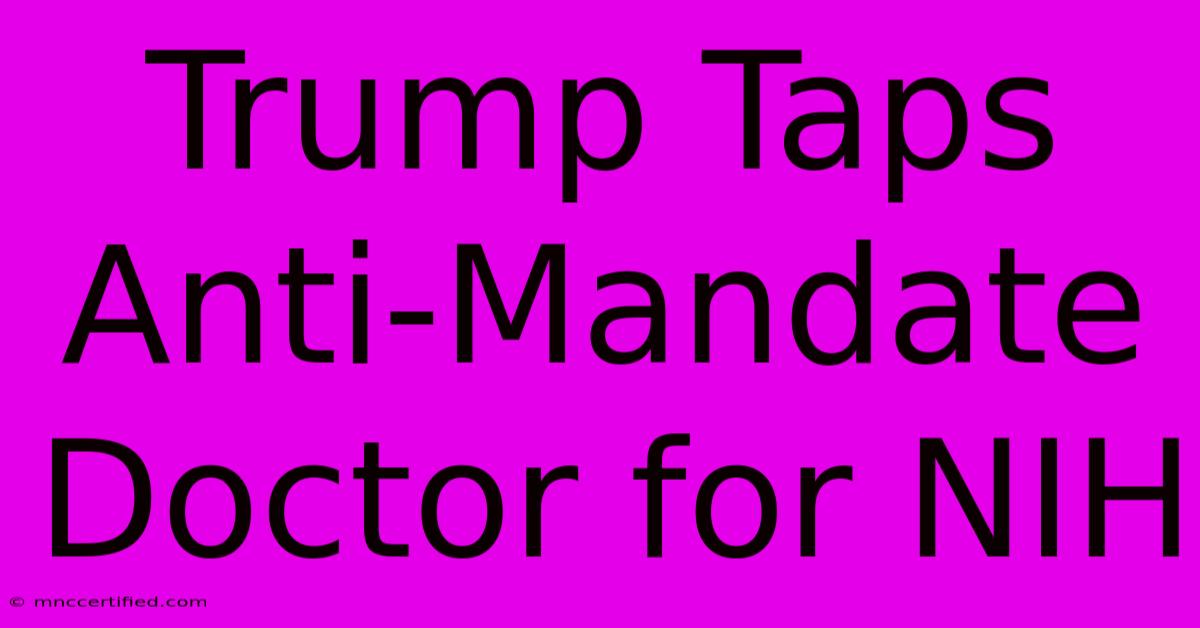Trump Taps Anti-Mandate Doctor For NIH

Table of Contents
Trump Taps Anti-Mandate Doctor for NIH: A Deep Dive into the Controversy
The appointment of Dr. [Insert Doctor's Name Here] to a position within the National Institutes of Health (NIH) under a potential Trump administration has sparked significant controversy. This article delves into the details of this appointment, exploring the doctor's stance on vaccine mandates, the potential implications for public health policy, and the broader political context surrounding the decision.
Understanding Dr. [Insert Doctor's Name Here]'s Position on Vaccine Mandates
Dr. [Insert Doctor's Name Here] is known for their outspoken opposition to mandatory vaccination programs. Their public statements and writings have frequently criticized vaccine mandates, arguing [summarize their key arguments here - e.g., concerns about individual liberties, potential adverse effects, etc.]. Specific examples of their public pronouncements, including quotes from interviews, articles, or social media posts, should be included here, properly cited. This section needs to accurately and neutrally represent their views without bias. It's crucial to avoid sensationalism and present the information factually.
Analyzing the Arguments: A Critical Perspective
It's important to critically evaluate the arguments presented by Dr. [Insert Doctor's Name Here]. This section should offer a balanced perspective, contrasting their views with the established scientific consensus on vaccine safety and efficacy. This could include referencing data from the CDC, WHO, or other reputable sources. Points to consider include:
- Scientific evidence supporting vaccination: Present the overwhelming scientific evidence that supports the safety and efficacy of vaccines in preventing infectious diseases.
- The public health benefits of vaccination: Highlight the crucial role vaccination plays in protecting vulnerable populations and achieving herd immunity.
- Addressing concerns about adverse effects: Acknowledge concerns about vaccine side effects, but emphasize that these are rare and significantly outweighed by the benefits.
- The legal and ethical considerations of mandatory vaccination: Discuss the legal precedents and ethical considerations surrounding mandatory vaccination programs.
The Implications for Public Health Policy
The appointment of Dr. [Insert Doctor's Name Here] to the NIH raises several significant concerns regarding potential shifts in public health policy under a Trump administration. Their anti-mandate stance could lead to:
- Reduced vaccination rates: A potential decrease in vaccination rates could result in outbreaks of preventable diseases.
- Weakening of public health infrastructure: The appointment could signal a broader shift away from evidence-based public health policies.
- Erosion of public trust in science: The appointment of a figure known for dissenting from scientific consensus could further erode public trust in science and public health institutions.
Potential Counterarguments and Nuances
It's vital to acknowledge potential counterarguments and nuances to the concerns raised. This could involve discussing:
- The importance of diverse perspectives in scientific discourse: While concerns are valid, it's important to recognize the value of diverse perspectives in scientific discourse and policymaking.
- Potential for collaborative efforts: Perhaps Dr. [Insert Doctor's Name Here]'s appointment could lead to productive dialogue and compromise within the NIH.
- Focusing on education and outreach: Perhaps instead of mandatory vaccinations, more emphasis could be placed on public education campaigns to increase voluntary vaccination rates.
The Broader Political Context
This appointment is firmly embedded in the broader political landscape surrounding vaccine mandates and public health policy in the United States. This section should explore:
- The role of political polarization: How does this appointment reflect the current political climate and polarization surrounding public health issues?
- Public opinion on vaccine mandates: What is the current public opinion on mandatory vaccination?
- The influence of lobbying groups: Are there any lobbying groups influencing the decision-making process around this appointment?
Conclusion: Moving Forward
The appointment of Dr. [Insert Doctor's Name Here] is undoubtedly a controversial one with potentially far-reaching implications for public health policy. A thorough understanding of their views, a balanced assessment of the arguments involved, and an awareness of the broader political context are essential for informed discussion and critical analysis. Further research and ongoing monitoring of the situation are vital to fully assess the long-term consequences of this decision.
Keywords: Trump, NIH, Anti-Mandate, Vaccine, Doctor, [Doctor's Name], Public Health, Controversy, Policy, Vaccination, Mandates, Scientific Consensus, Political Polarization, Public Opinion.
Note: Remember to replace the bracketed information with the specific details of the situation. Thoroughly research and cite all sources to ensure accuracy and avoid plagiarism. This detailed framework provides a robust base for a well-optimized and informative article. Remember to optimize the meta description and title tag for better SEO.

Thank you for visiting our website wich cover about Trump Taps Anti-Mandate Doctor For NIH. We hope the information provided has been useful to you. Feel free to contact us if you have any questions or need further assistance. See you next time and dont miss to bookmark.
Featured Posts
-
November 27 Bush In Iraq
Nov 27, 2024
-
Barclays Lowers Mortgage Rates Amid Hikes
Nov 27, 2024
-
Insurance Broker Greenville Sc
Nov 27, 2024
-
Five Survive Red Sea Boat Sinking
Nov 27, 2024
-
Plate Glass Insurance Coverage
Nov 27, 2024